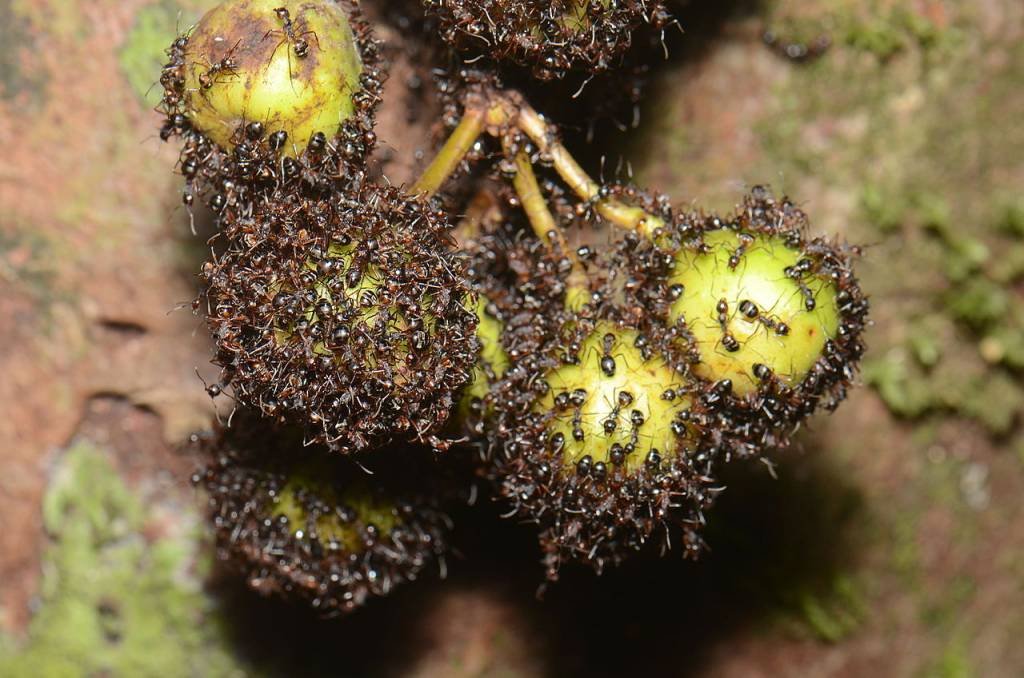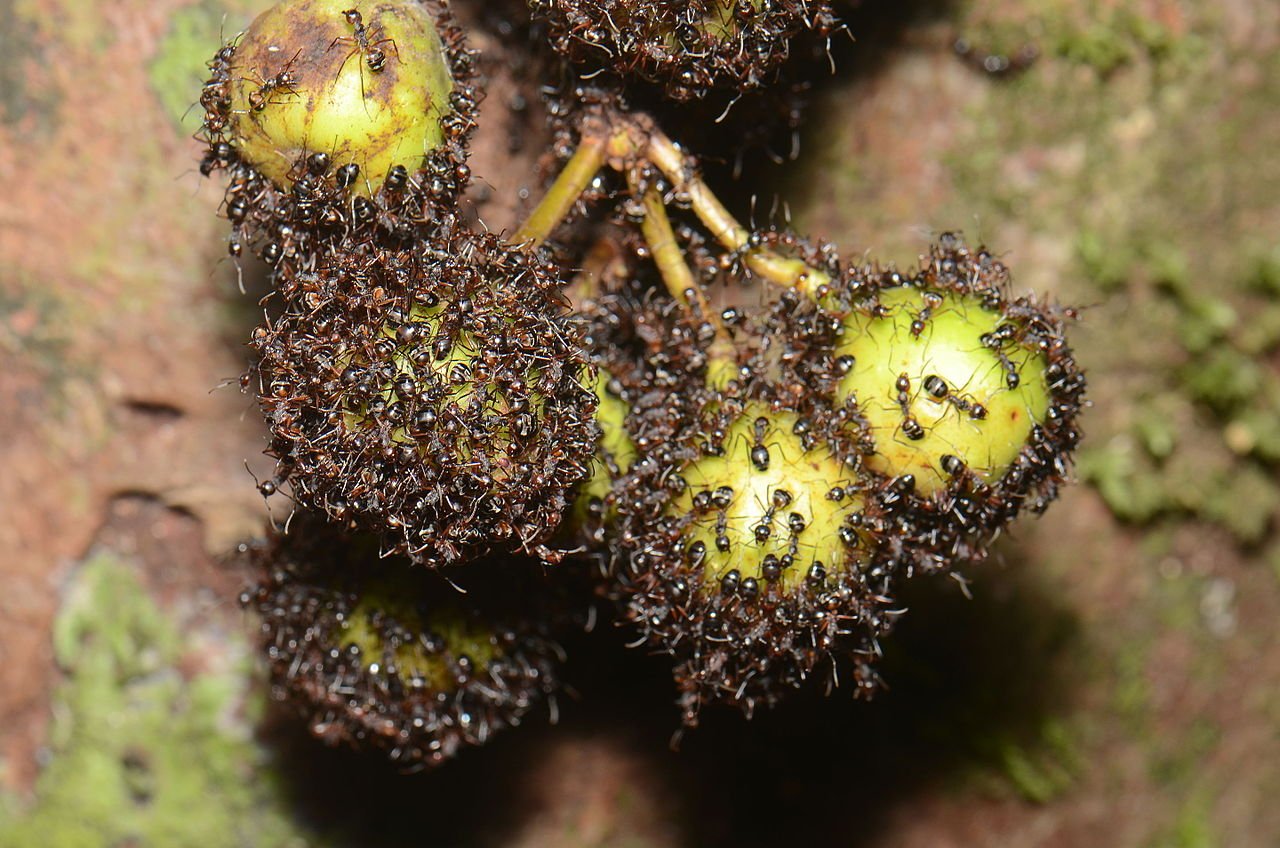Yes, ants are attracted to mold. Ants are known for their keen sense of smell and their ability to detect a wide range of odors, including those produced by mold. Mold emits a musty, damp odor due to the breakdown of organic matter, and this smell can attract ants.
Are Ants attracted to the mold?

There are a few reasons why ants are drawn to mold:
- Nutrition: Some types of mold can provide a food source for ants. Mold often grows on decaying or moist organic materials, which can serve as a food source for certain ant species. The ants feed on the mold and its byproducts.
- Moisture: Mold requires moisture to grow, and many ant species are attracted to damp environments. Ants may be drawn to mold-infested areas in search of water or the humidity associated with mold growth.
- Nesting Sites: Ants may establish nests in or near areas with mold growth. Mold-infested wood or decaying materials can provide a suitable nesting site for certain ant species.
- Chemical Attraction: The chemical compounds produced by mold can act as attractants for ants. These chemicals can serve as pheromones or cues that signal the presence of a potential food source.
Also Read: How to get rid of ants in the Electrical Outlet?
It’s important to address mold issues not only because they can attract ants but also for health and structural reasons. Mold can pose health risks to humans and pets and can cause damage to buildings and materials. To prevent ant infestations and mold growth, it’s essential to keep your living spaces clean, dry and well-ventilated.
Can Ants climb glass?
Yes, ants are capable of climbing glass surfaces. Ants possess impressive climbing abilities due to their physical characteristics and adhesive pads on their feet.
Physical Characteristics: Ants are small and lightweight insects. Their body structure, with six legs and sharp claws, allows them to easily grip and climb various surfaces, including glass.
Adhesive Pads: Ants have adhesive pads on their feet, which help them cling to surfaces. These adhesive pads, often referred to as “tarsal pads” or “sticky pads,” create friction and allow ants to walk on smooth and vertical surfaces like glass. The tiny hairs on these pads increase the surface area for grip and adhere to the glass, making it easier for ants to climb.
Also Read: How do ants make climbing walls look so easy?
These climbing abilities enable ants to explore various environments and reach potential food sources, nesting sites, or other locations of interest. If you have an ant infestation or want to prevent ants from entering your home, it’s important to seal any cracks or entry points, including those on glass windows and doors, to make it more difficult for ants to access your living space.
Can I vacuum ants?
Yes, you can use a vacuum cleaner to remove ants from your home. It’s an effective and practical way to quickly eliminate ants and their trail. Here are the steps to do it:
- Choose the Right Vacuum Cleaner: Opt for a vacuum cleaner with a hose attachment or an extension wand. This allows you to get into small crevices and corners where ants might be present.
- Prepare the Vacuum: Make sure the vacuum is clean and in good working condition. If it has a collection bag or container, ensure that it’s empty.
- Approach Carefully: Approach the area with ants cautiously. Do not disturb them too much, as this can cause them to scatter.
- Use the Hose Attachment: Attach the hose or extension wand to the vacuum cleaner. This will allow you to target the ants without getting too close to them.
- Vacuum the Ants: Gently and carefully vacuum up the ants. Move the hose or wand slowly to ensure you pick up as many ants as possible.
- Seal the Bag or Container: If your vacuum cleaner has a collection bag or container, seal it securely after you’re done to prevent the ants from escaping.
- Dispose of the Ants: If possible, take the bag or container outside to empty it. This prevents any trapped ants from returning to your home. You can also dispose of the bag in your regular trash.
- Clean the Vacuum: After you’ve finished, clean your vacuum to remove any ant residue. This will prevent any lingering ants from escaping inside the vacuum.
Using a vacuum cleaner to remove ants is a practical method, especially when dealing with a large number of ants or when you want to quickly eliminate them from your living space. However, it’s important to identify and address the source of the ant problem to prevent future infestations. If you notice ants frequently, consider taking measures to seal entry points and maintain a clean environment to deter them from returning.
Can febreze kill ants?
If you are dealing with an ant infestation and need to get rid of ants, it’s best to use ant baits, sprays, or other insecticides specifically formulated to target and eliminate ants. These products contain active ingredients that are effective in killing ants and addressing the root of the ant problem.
Using Febreze as a method to control ants is not recommended, as it will not provide a long-term solution and may not effectively address the infestation. Instead, consider using appropriate ant control products or consulting a pest control professional for more effective and lasting results.
Can ants fart?
The gas produced by ants during digestion is released through their spiracles, which are tiny openings in their exoskeleton that allow for gas exchange. This gas release is a continuous and gradual process and is not typically associated with the audible sounds or odors commonly associated with flatulence in mammals.
In summary, while ants do produce gas as part of their metabolic processes, it is not a form of flatulence as seen in some animals and is not usually associated with the same characteristics.
Can you vacuum ants?
1. Choose the Right Vacuum Cleaner: Opt for a vacuum cleaner with a hose attachment or an extension wand. This allows you to reach into small crevices and corners where ants may be present.
2. Prepare the Vacuum: Ensure that your vacuum cleaner is clean and in good working condition. If it has a collection bag or container, make sure it’s empty.
3. Approach Carefully: Approach the area with ants cautiously. Do not disturb them too much, as this can cause them to scatter.
4. Use the Hose Attachment: Attach the hose or extension wand to the vacuum cleaner. This will allow you to target the ants without getting too close to them.
5. Vacuum the Ants: Gently and carefully vacuum up the ants. Move the hose or wand slowly to ensure you pick up as many ants as possible.
6. Seal the Bag or Container: If your vacuum cleaner has a collection bag or container, seal it securely after you’re done to prevent the ants from escaping.
7. Dispose of the Ants: If possible, take the bag or container outside to empty it. This prevents any trapped ants from returning to your home. You can also dispose of the bag in your regular trash.
8. Clean the Vacuum: After you’ve finished, clean your vacuum to remove any ant residue. This will prevent any lingering ants from escaping inside the vacuum.
This method is an effective way to quickly eliminate ants from your living space. However, it’s important to identify and address the source of the ant problem to prevent future infestations. If you notice ants frequently, consider taking measures to seal entry points and maintain a clean environment to deter them from returning.
Using a vacuum cleaner to remove ants is safe and efficient, and it doesn’t involve the use of chemicals or pesticides.
Do ants eat grasshoppers?
Grasshoppers are herbivorous and primarily feed on plants, including grasses and crops. They do not serve as a common food source for ants.
Ants tend to focus on insects that are more manageable to capture and transport back to their nests. These insects might include aphids, caterpillars, or other smaller arthropods.
It’s essential to recognize that ant behavior can vary based on their species and local environmental conditions. While it’s not common for ants to prey on grasshoppers, there could be exceptions in specific situations. Nevertheless, in the majority of cases, ants do not play a significant role as predators of grasshoppers.
Do ants explode when they fart?
It’s important to understand that the amount of gas produced by ants is quite minimal, and it is not associated with the audible sounds or odors that are commonly linked to flatulence in certain mammals. The gas released by ants serves a physiological function related to respiration and does not result in any extraordinary or harmful consequences for the ants themselves.


2 thoughts on “Are Ants attracted to mold?”
Comments are closed.